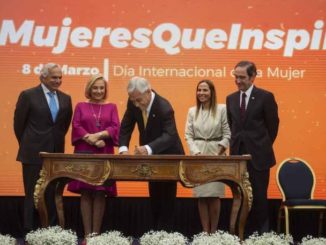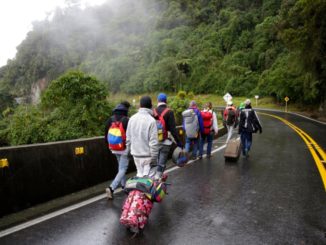
LIMA – Pedro Pablo Kuczynski on Wednesday tendered his resignation after just a year and seven months in office, in the midst of a “vote‑buying” scandal.
Congress still has to vote on whether to accept President Kuczynski’s resignation. Lawmakers will meet on Thursday to discuss the issue and are expected to put it to a vote later on Thursday or Friday.
After months of allegations of corruption against Mr Kuczynski, what forced him to tender his resignation were highly damaging secretly filmed videos and audios.
He remitido al Congreso el original de esta carta, que he transmitido al Perú, renunciando al cargo de Presidente Constitucional de la República. pic.twitter.com/PHX6ZccU9r
— PedroPablo Kuczynski (@ppkamigo) March 21, 2018
They apparently show his allies trying to persuade members of Congress to back Mr Kuczynski in the impeachment vote which had been scheduled for Thursday.
In exchange, the members of Congress were offered lucrative public works projects for their constituencies.
The release of the recordings, just two days before the impeachment vote, piled on pressure on the already beleaguered president.
Peru president manages to survive impeachment but emerges weaker
Lawmakers from his own party withdrew their support and Mr. Kuczynski resigned on Wednesday.
President Kuczynski defended himself in a televised message, saying the video footage had been edited to incriminate him.
Pedro Pablo Kuczynski confirma su renuncia al cargo de presidente de la Repúblicahttps://t.co/EnvmsdaJh0 pic.twitter.com/6PUiQDZ0s8
— AgenciaPeru.Net (@AgenciaPeruNet) March 21, 2018
“The opposition has tried to paint me as a corrupt person and they have managed to influence a group of reasonable and honest workers around me, getting them unfairly involved in this plot to destroy the government,” he said.
“I categorically reject these unsubstantiated claims and reaffirm my commitment to an honest, moral and fair Peru for everyone.”
“I’ve worked for nearly 60 years of my life with complete honesty,” the 79-year-old leader said. “Faced with this difficult situation… I think it is best for the country if I resign from the presidency of the republic.
“I don’t want the country or my family to continue to suffer the uncertainty of recent times.”
The first vice‑president and current ambassador to Canada, Martín Vizcarra, has agreed to assume the presidency – an outcome greeted favorably by markets.
A former governor of a mining-rich province, the 55-year-old is seen as business-friendly but some Peruvians have questioned whether he has the political experience to handle the presidency at a time of crisis.
Huge challenges await Mr. Vizcarra. On the domestic front, he will need to work with an obstructive Congress to prioritize the approval of projects, especially in the construction sector, which has been hit hardest by corruption scandals.
Trump to visit Peru and Colombia in first Latin America tour
On the foreign policy front, Mr. Vizcarra’s immediate test will be to reassure world leaders as a cloud of uncertainty looms over the upcoming Summit of the Americas, due to take place in Lima, the Peruvian capital, in mid April.



